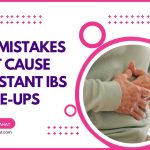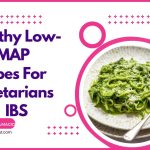Bloating With IBS: 10 Best Treatment Tips
Our content is not intended nor recommended as a substitute for medical advice by your doctor. Use for informational purposes only.
1 . Avoid foods that give you bloating.
Food is a significant contributor to IBS bloating. IBS patients are proved to improve after they cut or decrease gassy foods from their diet.
Scientists Identified a group of carbohydrates (sugars) that rapidly ferment and produce symptoms of IBS (abdominal pain, bloating, and changes in bowel movement). This group of food is called (Fermentable Oligo-, Di, Monosaccharides, and Polyols) or FODMAPs.
A Low FODMAP diet plan improved IBS symptoms in most IBS patients (reference).
The table below illustrates FODMAP diets that lead to bloating and other IBS symptoms.
FODMAP GROUP | FOODS |
Fruits | Apples Apricot Avocado Bananas (ripe) Blackberries Cherries (dried) Currants Custard apple Dates Logan dried Figs Goji berries (dried) Peeled grapefruits Guava (unripe) Jackfruit (dried) Melon, honey due Nectarine Paw Paw Peach (all types) Pear (except prickly) Persimmon Pineapple (dried) Plum (black and diamond types) Pomegranate Prunes Raisins Rambutan Raspberry Sultanas Tamarillo Watermelon |
Vegetables. | Artichoke (globe, Jerusalem, and pickled) Asparagus Beetroot Bitter Melon Black Garlic Broccoli (stalks only) Broccolini (whole) Brussel sprouts Butternut squash Babbage, savoy cauliflower Celery Chilli (ancho, chipotle) Corn kernels, canned Galic Indian gooseberry Karela Kimchi Leek (bulb) Lotus root (dried) Mangetout Mushroom (button, enoki, porcini, portobello, shiitake, and black chanterelle) Onions (Spanish, white, spring, and pickled onions) Peas Pumpkin (butternut) White cabbage, sauerkraut Yucca root |
Cereals | Almond meal Amaranth Parley, pearl Burghal Bran, wheat, unprocessed Couscous, rice, and corn, wheat Corn flakes Flakes of rice with psyllium Flakes of wheat, barley, oats Flour: chestnut, Khorasan, whole wheat, amaranth, barley, coconut, einkorn, emmer, lupin, rye, Spelt, white, wheat. Freekeh Grains, rye Muesli: most types Noodles, wheat Oatmeal Pasta: Gnocchi, Wheat pasta, Split. Raisin toast Semolina, fine Spelt, kernels Wheat bran, pellets Wheat germ, raw wheat grain, raw, sprouted Whole wheat grain biscuit |
Diary Products | Cow milk Goat milk Sheep milk Soy milk made with soybeans Buttermilk Cream Custard Greek yogurt Ice cream Sour cream Yogurt Cream cheese Ricotta cheese |
Alochols. | Almost all types, especially carbonated drinks. |
Others | Hommus dip Jam (mixed berries) Pasta sauce (cream-based) Relish Tzatziki dip Agave Honey Inulin Isomalt Maltitol Mannitol Sorbitol Xylitol Coconut water Apple juice Pear juice Mango juice Sodas with high fructose corn syrup Fennel tea Herbal Tea (Strong) |
2. Change your eating habits.
Eating habits greatly influence bloating with IBS. Use these practical tips to decrease IBS bloating:
- Eat slowly: give yourself at least 20 to 30 minutes so you can digest food properly. When you eat fast, you will swallow more air and will not chew properly. Consequently, you will get more bloating with IBS.
- Eat regularly: another common practice seen with my patients is that they eat one or two large meals per day (because of anorexia and the fear of abdominal pain). Eating one or two meals a day can hurt your IBS and bloating. You have to train your digestive system to have the same amount of food at the same time. Small frequent meals are better than large one or two meals per day.
- Don’t talk while you eat: Taking while eating will make you swallow more air. The swallowed air will eventually exaggerate bloating with IBS.
3. Avoid Lying down directly after eating.
Some people tend to lay down on the bed directly after eating, which relieves bloating.
Lying down can worsen bloating with IBS as it delays your stomach emptying.
Although you will get instant relief from the bloating, you will experience an uncomfortable bloating sensation later.
Practical tips for resisting the urge to lay down:
- Adjust your meal time before you go out from home.
- Set your waking or fitness time after meals.
- Have your dinner early. At least 2 hours before you go to bed.
4. Get rid of IBS constipation.
IBS bloating is more common in patients with constipation-predominant IBS. Moreover, bloating is very common with constipation in general (not only with IBS-constipation).
Treating your constipation will significantly improve your bloating.
5. Eat the optimum amount of fiber.
The relationship between fiber diet and IBS and Bloating is complex. An optimum amount of fiber will help you to regulate your bowel movement and improves IBS constipation.
Excess fiber will worsen your IBS bloating. Unfortunately, there is no specific amount of fiber you should eat.
Increasing the amount of fiber in your diet slowly to the maximum tolerable dose will help you fight IBS bloating.
It will take some trials and errors to achieve the optimum amounts of dietary fiber for IBS. Also, you can take a fiber supplement such as Metamucil.
Learn More about Fiber and IBS.
6. Exercise.
Normal bowel motility is related to your physical activity. If you live a sedentary life, this will increase your IBS-related bloating.
People who sit or lay on the couch after meals are more likely to experience bloating with IBS.
Practical tips to stay fit
- Give yourself a walk for 10 to 20 minutes
- Try some yoga poses like the cat and cow position.
- Walk on a treadmill.
7. Probiotics
Probiotics are popular nowadays. It is estimated that about 4 million people in the United States are taking probiotics (reference).
Probiotics are promising in the treatment of IBS. Several studies show that they can be effective in relieving IBS bloating.
Probiotics are specific strains of good bacteria that can have beneficial effects on your digestive system.
One of the theories of irritable bowel syndrome is an imbalance between good gut bacteria and harmful bacteria.
- Examples of good bacteria of the lactobacillus and bifidobacterium
- Examples of harmful bacteria are E-Coli, Clostridium difficile, and Streptococci.
Probiotics help to regain your digestive system balance and fight harmful bacteria. Many IBS sufferers report improvement in IBS bloating with probiotics (reference).
8. Over-the-counter medications.
Activated charcoal:
Activated charcoal is considered an air-absorbing tablet. The tablets are formed of millions of tiny balls that absorb excess air and unwanted materials in your stomach.
Activated charcoal significantly improves IBS bloating in clinical trials (reference).
Usually, it is recommended to be taken after meals for a better effect.
Activated charcoal may worsen constipation, so It is better to avoid it if you have bloating with IBS constipation.
Learn more about activated charcoal.
Simethicone:
Simethicone is another safe over-the-counter drug for bloating and flatulence with IBS.
It acts by decreasing the surface tension of gases in your stomach and intestine. When the surface tension of gas decreases, it will become easier for you to get rid of gases.
Simethicone also is not absorbed and acts only locally. Therefore, it is a safe medication, and there is no contraindication for taking this medication.
9. Prescription medications.
In many IBS patients, IBS-related bloating is due to a hypertensive digestive system rather than excess gas. If the above remedies fail to control IBS bloating, ask your doctor about prescription medications for bloating with IBS.
Medications that modulate the feeling of abdominal pain, such as Tricyclic antidepressants, may improve persistent IBS bloating.
Other prescription anti-constipation medications such as Lubpristone may result in improvement of your IBS bloating.
This will requires you to discuss the issue with your doctor to define the best treatment.
- Evidence-based
- Written by a doctor.

Related Posts:
- 8 Tips To Avoid Vomiting & Nausea During Colonoscopy…
- 7 Effective Hiatal Hernia Pain Relief Tips: Doctor Explains.
- Diarrhea After Gallbladder Removal: Causes, How Long…
- Fatty Liver Pain: Causes, Mimics, and Treatment;…
- 9 Best Juices For IBS (& How to Drink Them Safely)
- 17+ Delicious Breakfast Ideas For IBS-Constipation.





